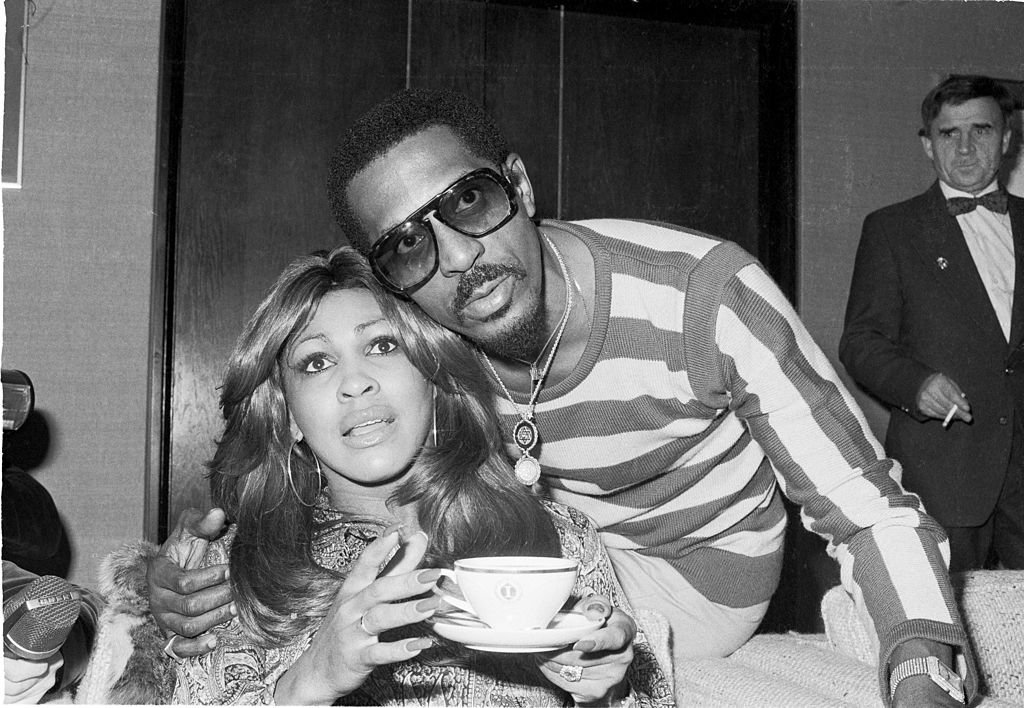
Tina Turner’s 2nd Husband Erwin Bach Risked Himself to Give Her “The Gift of Life”
Music Icon Tina Turner and former Music Executive Erwin Bach have a relationship that is considered one of the most enduring romances in rock music.
When the couple met in the mid-1980s, it was love at first sight for Tina Turner, and she took the first step to make their relationship happen. Over three decades later, their love has continued to grow stronger.
Even when her health deteriorated, her husband was by her side. To help ease the pain of her sufferings, he took a risk and gave her "the gift of life."

Tina Turner onstage at the World Music Theater in Illinois on June 28, 1997 (left), Tina Turner and Erwin Bach in 2005 (right) | Photo: Getty Images
TINA AND IKE TURNER
Anna Mae Bullock, now known as Tina Turner, was born in 1939. Her grandmother raised her after her parents split, and as a teen, she loved the R&B music scene.
One night, when she went to a local club in Manhattan, she met Ike, the leader of Kings of Rhythm. They were said to be one of the first groups to introduce rock and roll to the world with their song "Rocket 88."
Tina found Ike unattractive and had no romantic feelings for him. However, she was drawn to his voice. They formed a musical bond when she sang his version of B.B. King's "You Know I Love You."

Photo of Tina Turner and Ike Turner in London in 1975 | Photo: Getty Images
Performing as Ike and Tina Turner Revue, the duo released their first R&B hit titled "A Fool in Love" in 1960. The song reached No. 2, their relationship became intimate, and they reportedly got married in Tijuana, Mexico, in 1962.
Their band was successful, but Ike physically and emotionally abused Tina regularly. At some point, she attempted suicide to get away from him. In 1976, she finally got away, and their divorce was finalized in 1978.
During the divorce, she took no assets with her except for her performance name and two cars. Tina spent the next few years focusing on her recovery and career.
TINA AND BACH
Bach is a German-born music executive who worked for the British record company EMI. He is well known in the music industry and has worked with Queen, Paul McCartney, Pink Floyd, and Radiohead.
Tina and Bach met in the mid-1980s when he was working as a label executive. Her manager had sent him to pick her up from an airport in Germany.
Even though she was tired from her trip and worried about her concert tour, she still noticed him. For Tina, it was an instant emotional connection.
She ignored the voices in her head that tried to discourage her from falling in love. She let him know about her feelings, and in 1985, he visited her in Los Angeles.
He never felt intimidated by her, and Tina loved that he was laid back, unpretentious and comfortable. On her 50th birthday in 1989, Bach proposed to Tina, but she didn't give him an answer.
In 1995, Tina and Bach moved to Switzerland, and in 2013, she formally relinquished her U.S. citizenship. That same year, she and Bach got married after dating for 27 years.
Three years after their nuptials, Tina experienced significant health problems. In her book titled "My Love Story," the "What's Love Got to Do With It" singer revealed the health challenges she had to deal with.
In 2016, she had suffered a stroke, vertigo and was diagnosed with intestinal cancer. She was also dealing with high blood pressure, and the path to recovery left her drained.
Shortly after, Tina's doctors informed her that the high blood pressure might be affecting her kidneys. To further investigate, he referred her to a kidney specialist.
The kidney specialist, Dr. Jörg Bleisch, then informed her that her kidneys' performance was at 35 percent of their normal function. He then asked that the situation be monitored.
One month after her intestinal cancer diagnosis, she had surgery to remove the affected part of her intestines. Tina had been lucky that they had detected cancer early, and it was slow-moving.
Just as she felt optimistic, Dr. Bleisch informed her that her kidneys were deteriorating. This news had them facing a medical dilemma.
As a cancer patient, she had been put on medications to boost her immune system. However, they put transplant patients on medications to suppress their immune system for a transplant to occur.
Consequently, the treatment she was taking and the treatment she needed for the transplant to work were contradictory. Dr. Bleisch then told her that post-cancer surgery was unlikely and they would postpone considerations for a year.
She didn't know where she would get a kidney from if she needed one because the organ-donor rate in Switzerland was the lowest in Europe.
Also, being a woman in her seventies with cancer made her situation more difficult. She would have had to wait indefinitely to get to her turn on the donor list, and the black market was never an option.
With time, the toxins in her body started to take over, and Dr. Bleisch told her that she needed dialysis. Tina shared that she didn't want to be hooked onto a machine and gradually accepted that she would die.
Tina began to consider the options of assisted suicide and signed up with an organization that offered the service of coordinating the process.
When the idea of her death became a reality for Bach, he got emotional and told her that he never wanted to lose her. He told her that he didn't want another life or another woman.
He was ready to do anything to keep them together. At that point, Bach offered Tina one of his kidneys. Even though she was overwhelmed by his offer, she tried to talk him out of it.
She had wanted him to think about his future before taking such an irreversible step. But Bach had made up his mind, and he said,
"My future is our future."
By December 2016, Tina's kidneys were performing at 20 percent, and a transplant would be her only salvation. She went for another colonoscopy and was told she was cancer-free.
It was good news as she no longer had to deal with the dilemma of the medications required for a successful transplant. The couple chose their preferred hospital and hoped Bach's kidney would be a good match.
After the transplant, the couple enjoyed a flawless recovery, and within seven days, they were discharged. Tina was thankful to her husband and thankful that she was also thriving after recovery. By giving her one of his kidneys, Bach had given her "the gift of life."
If you or someone you know is considering suicide, please contact the National Suicide Prevention Lifeline at 1-800-273-TALK (8255), text "help" to the Crisis Text Line at 741-741, or go to suicidepreventionlifeline.org.
The information in this article is not intended or implied to be a substitute for professional medical advice, diagnosis or treatment. All content, including text, and images contained on news.AmoMama.com, or available through news.AmoMama.com is for general information purposes only. news.AmoMama.com does not take responsibility for any action taken as a result of reading this article. Before undertaking any course of treatment please consult with your healthcare provider.
news.AmoMama.com does not support or promote any kind of violence, self-harm, or abusive behavior. We raise awareness about these issues to help potential victims seek professional counseling and prevent anyone from getting hurt. news.AmoMama.com speaks out against the above mentioned and news.AmoMama.com advocates for a healthy discussion about the instances of violence, abuse, sexual misconduct, animal cruelty, abuse etc. that benefits the victims. We also encourage everyone to report any crime incident they witness as soon as possible.
